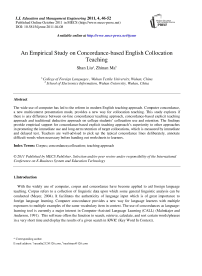An Empirical Study on Concordance-based English Collocation Teaching
Автор: Shan Liu, Zhinan Ma
Журнал: International Journal of Education and Management Engineering(IJEME) @ijeme
Статья в выпуске: 4 vol.1, 2011 года.
Бесплатный доступ
The wide use of computer has led to the reform in modern English teaching approach. Computer concordance, a new multicontext presentation mode, provides a new way for collocation teaching. This study explores if there is any difference between on-line concordancer teaching approach, concordance-based explicit teaching approach and traditional deductive approach on college students' collocation use and retention. The findings provide empirical support for concordance-based explicit teaching approach's superiority to other approaches in promoting the immediate use and long-term retention of target collocations, which is measured by immediate and delayed test. Teachers are well-advised to pick up the typical concordance lines deliberately, annotate difficult words when necessary before handing out worksheets to learners.
Corpus, concordance, collocation, teaching approach
Короткий адрес: https://sciup.org/15013607
IDR: 15013607
Список литературы An Empirical Study on Concordance-based English Collocation Teaching
- Allan, Q. 'Enhancing the language awareness of Hong Kong teachers through corpus data'. Journal of Technology and Teacher Education, 1999 , pp.57-74.
- A.P,He.Corpus Linguistics and English Teaching.Beijing:Foreign Language Teaching and Research Press,2004. (in Chinese)
- Charles F. Meyer. English Corpus Linguistics: An Introduction John Benjamins Publishing Company,2002.
- Coady, J. L2 vocabulary acquisition through extensive reading. [A] In J. Coady & T. Huckin. (eds.), Second language vocabulary acquisition: A rationale for pedagogy. Cambridge: Cambridge University Press,1997.
- Cobb, T. Breadth and depth of vocabulary acquisition with hands-on concordancing. Computer Assisted Language Learning vol.12,2005.
- G.H,Ma.Lexical Bundles in L2 Timed Writing of English Majors. Foreign Language Teaching and Research,2009(1). (in Chinese)
- Krashen, S. We acquire vocabulary and spelling by reading: Additional evidence for the input hypothesis. Modern Language Journal, vol. 73, 1989, pp.440-464.
- Keith Folse. Vocabulary Myths : Applying Second Language Research to Classroom Teaching .Michigan: University of Michigan Press,2004.
- Marton, W. & Mickiewicz, Foreign vocabulary learning as problem No. 1 of language teaching at the advanced level. Interlanguage Studies Bulletin, vol.2, 1977, pp.33-57.
- Mondria J . The effects of contextual richness on the guessability and the retention of words in a foreign language .System, vol.29, 2001,pp.91-102.
- P.Y.Shi.CLEC-based Verb-Noun Collocation Error Analysis [J].Journal of Tianjin Foreign Studies University, 2007(4).(in Chinese)
- W.L.Shi.The relationship between English Collocation and Language output Quality. Foreign Language Research, 2007(4). (in Chinese)
- Woolard, G. Collocation--encouraging learner independence. In M. Lewis (Ed.), Teaching collocation: further developments in the lexical approach,pp. 28-46. London: Language Teaching Publications,2000.
- W.Z, Li.Verb-Noun collocations and error Analysis in COLEC.Foreign Language Teaching,2004(4).(in Chinese)


